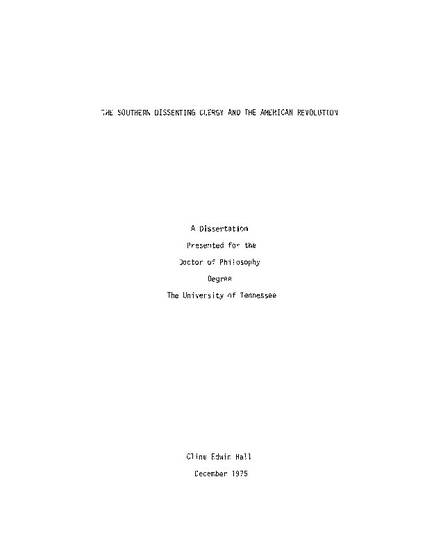
The purpose of this study was to determine the importance of the southern dissenting clergy in the American Revolution. Rapidly growing in numbers in the quarter century before the Revolution, these men began to take places of leadership in which they could actively influence their communities. Even though their sermons were important sources of whig ideology, the clergy had a natural tendency to steer away from political involvement. This reluctance, along with their location outside the political and religious establishment in the South, forced them into a position of moderation rather than militant leadership regarding the issues leading to the Revolution. Yet in their own way they contributed to the creation and development of patriot spirit. Their activities in the Carolina backcountry, for example, weakened the loyalists, and their support of and modest participation in the extralegal agencies of government everywhere in the South demonstrated their whig thought. Religious issues that aroused the dissenting clergy of the North did not have the same effect in the South. Though of minor concern, the episcopate controversy and the passage of the Quebec Act did not cause enough excitement among the southern dissenters to be classified as causes of the Revolution. The major issue that the dissenting clergy came to support was the struggle for disestablishment of the Anglican church. Undergirded by the efforts of such libertarians as Jefferson, Madison, and Mason, the Baptists and Presbyterian ministers provided the enthusiasm to bring disestablishment to a successful conclusion. By far the best indication of the course of action taken by the dissenting clergy was the example they set during the Revolution. Changing from men of moderation to active participants, they served as soldiers, chaplains, and recruiters of troops. Up to two-thirds of them can be definitely classified as whigs, with another one-third as pacifists. Only a very few were loyalists. Their main contribution, however, was the propagation of a political philosophy of resistance to British oppression and their enthusiasm for freedom of conscience in the realm of religion.
Available at: http://works.bepress.com/cline_hall/1/
